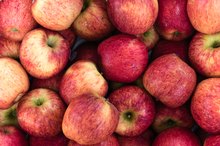ATP & Protein
ATP is a chemical energy molecule that your cells use to provide for their fuel needs. The relationship between ATP and protein is a complicated one. You can make ATP by burning protein that you eat, you need functional proteins to help in the process of building ATP, and proteins can break down ATP.
ATP
ATP stands for adenosine triphosphate --- it's an energy molecule that works as a sort of "chemical currency." Cells produce ATP by breaking down carbohydrates, proteins and fats that you eat. They then use the ATP to perform various processes. For instance, muscle cells need ATP to contract, while cells that secrete hormones use ATP to produce the hormones they release, explains Dr. Lauralee Sherwood in her book "Human Physiology."
- ATP stands for adenosine triphosphate --- it's an energy molecule that works as a sort of "chemical currency."
- For instance, muscle cells need ATP to contract, while cells that secrete hormones use ATP to produce the hormones they release, explains Dr. Lauralee Sherwood in her book "Human Physiology."
ATP From Protein
The Link Between White Blood Cells & Protein
Learn More
When you eat protein, you can use the energy in the protein to make ATP. Proteins consist of long chains of chemical building blocks called amino acids, explain Drs. Reginald Garrett and Charles Grisham in their book "Biochemistry." You digest the protein you eat into amino acids, and then absorb these into the bloodstream. Your cells then burn the amino acids, producing carbon dioxide, water and other wastes, and releasing energy in the process. The cells store the released energy by using it to make ATP.
- When you eat protein, you can use the energy in the protein to make ATP.
Making ATP With Protein
The process of making ATP --- regardless of whether the energy to make it comes from carbohydrate, protein or fat --- requires protein. This is because, like many of the chemical reactions in the body, ATP synthesis uses enzymes. An enzyme is a functional protein that helps chemical reactions take place faster than they otherwise would. There are many different enzymes --- including the major enzyme ATP synthase --- involved in ATP production.
- The process of making ATP --- regardless of whether the energy to make it comes from carbohydrate, protein or fat --- requires protein.
- There are many different enzymes --- including the major enzyme ATP synthase --- involved in ATP production.
Breaking Down ATP
Bodybuilding With Papaya Enzyme for Protein Absorption
Learn More
Even the process of breaking down ATP to extract the stored energy requires protein. For instance, when your muscles contract, they require energy. This comes from breaking down ATP molecules --- a process called ATP hydrolysis. Enzymes that hydrolyze ATP are made of protein. Breaking down ATP by using enzymes doesn't affect the enzymes themselves --- they're unchanged in the reaction--but it does destroy the ATP, which is why you must continually supply nutrients so that your cells can make more.
- Even the process of breaking down ATP to extract the stored energy requires protein.
Related Articles
References
- “Human Physiology”; Lauralee Sherwood, Ph.D.; 2004
- “Biochemistry”; Reginald Garrett, Ph.D. and Charles Grisham, Ph.D.; 2007
Writer Bio
Kirstin Hendrickson is a writer, teacher, coach, athlete and author of the textbook "Chemistry In The World." She's been teaching and writing about health, wellness and nutrition for more than 10 years. She has a Bachelor of Science in zoology, a Bachelor of Science in psychology, a Master of Science in chemistry and a doctoral degree in bioorganic chemistry.









